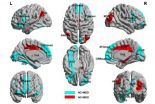(Press-News.org) The study, published today in PLOS Pathogens, explored the ways the rotavirus infection contributes to autoimmune disease in mice, and researchers believe the breakthrough could be relevant to human infection with rotavirus.
The research found that it may be the "bystander effect" that causes the rotavirus infection to accelerate the onset of type 1 diabetes.
The "bystander effect" suggests that the virus provokes a strong activation of the immune system, which then spills over, allowing the immune system to attack not only the viral intruder but some of the body's own cells, in this case the insulin-producing cells in the pancreas.
Lead researcher Associate Professor Barbara Coulson from the Peter Doherty Institute for Infection and Immunity said the research was the first to find that rotavirus activates this type of immune response in mice.
"This bystander mechanism provides a potential explanation for the acceleration of type 1 diabetes development by rotavirus infection in mice."
"It is possible that the same process could operate following human rotavirus infection, and lead to a more rapid progression of children towards type 1 diabetes. Further studies are needed to determine the relevance of our findings to humans," she said.
"Ultimately, this should help us understand the link between virus infection and the development of type 1 diabetes."
"Understanding how rotavirus affects human type 1 diabetes development is expected to facilitate the implementation of preventative treatment for children at risk this disease. For example, treatments that dampen down the particular type of immune response caused by rotavirus may be beneficial," she concluded.
INFORMATION:
The research was funded by the National Health and Medical Research Council of Australia.
Childhood virus may increase type 1 diabetes risk
2014-03-31
ELSE PRESS RELEASES FROM THIS DATE:
Role of type-2 astrocytes on the repair of spinal cord injury
2014-03-31
Increasing expression of bone morphogenetic proteins at the lesion site of the central nervous system possibly induces oligodendrocyte precursor cells to differentiate into type-2 astrocytes. While the restriction of oligodendrocyte differentiation could affect remyelination, it remains poorly understood how type-2 astrocytes regulate regeneration and functional recovery. Thus, examining the effects of type-2 astrocytes on neuronal growth is helpful in understanding the possible influential factors of oligodendrocyte precursor cells on axonal regeneration and remyelination, ...
Resting-state functional connectivity as an auxillary diagnosis of depression
2014-03-31
According to a paper published in the Neural Regeneration Research (Vol. 9, No. 2, 2014), both depressive patients and healthy controls presented typical small-world attributes, and compared with healthy controls, characteristic path length was significantly shorter in depressive patients, suggesting development toward randomization. Patients with depression showed apparently abnormal node attributes at key areas in cortical-striatal-pallidal-thalamic circuits. In addition, right hippocampus and right thalamus were closely linked with the severity of depression. An artificial ...
How does acupuncture at Baihui and Dazhui reduce brain cell apoptosis in heroin readdicts?
2014-03-31
Acupuncture has therapeutic effects on cerebral ischemia, dementia, epilepsy and other brain diseases, and also functions to repair the nervous system. Dazhui (GV14) and Baihui (GV20) are the preferred acupoints for treatment. However, whether acupuncture can treat addiction and prevent readdiction through changes to brain cell ultrastructure remains unknown. A research team from Anhui University of Traditional Chinese Medicine in China pointed out that cell apoptosis was observed in the hippocampus and frontal lobe of heroin readdicted rats by electron microscopy, and ...
Metformin does not improve heart function in patients without diabetes
2014-03-31
Although some research has suggested that metformin, a medication often used in the treatment of diabetes, may have favorable effects on ventricular (heart) function, among patients without diabetes who underwent percutaneous coronary intervention (PCI; a procedure such as stent placement used to open narrowed coronary arteries) for ST-segment elevation myocardial infarction (STEMI; a certain pattern on an electrocardiogram following a heart attack), treatment with metformin did not result in improved ventricular function, according to a JAMA study released online to coincide ...
Cleveland Clinic study shows bariatric surgery provides long-term control of diabetes
2014-03-31
Cleveland: A study by Cleveland Clinic researchers shows bariatric surgery is a highly effective and durable treatment for type 2 diabetes in obese patients, enabling nearly all surgical patients to be free of insulin and many to be free of all diabetic medications three years after surgery.
The STAMPEDE (Surgical Therapy And Medications Potentially Eradicate Diabetes Efficiently) trial was simultaneously published in the New England Journal of Medicine and presented today at the Annual Scientific Session of the American College of Cardiology in Washington, D.C.
The ...
Addicts who live in the moment may benefit most from certain kinds of treatment
2014-03-31
Drug-dependent people who least take the future into account may, paradoxically, be the ones to benefit the most from certain treatments.
The human instinct to choose instant gratification, such as a drug high, over a later benefit, such as good health — known as future or delay discounting — is strong in people with drug dependencies. An important component of addiction is failure to exert self-control in recognition of future consequences.
In a study in Clinical Psychological Science, a team of researchers has found an unexpected pattern that may provide hope for ...
Diamonds are an oil's best friend
2014-03-31
A mixture of diamond nanoparticles and mineral oil easily outperforms other types of fluid created for heat-transfer applications, according to new research by Rice University.
Rice scientists mixed very low concentrations of diamond particles (about 6 nanometers in diameter) with mineral oil to test the nanofluid's thermal conductivity and how temperature would affect its viscosity. They found it to be much better than nanofluids that contain higher amounts of oxide, nitride or carbide ceramics, metals, semiconductors, carbon nanotubes and other composite materials. ...
Academic workplace bias against parents hurts nonparents too
2014-03-31
Parents have reported before that trying to balance work and family obligations comes with career costs. But a new study from Rice University and the University of California, San Diego, shows that university workplace bias against scientists and engineers who use flexible work arrangements may increase employee dissatisfaction and turnover even for people who don't have children.
"As researchers, we're interested in understanding the gap between the traditional 9-to-5 work setting and what workers actually need," said Erin Cech, an assistant professor of sociology at ...
Clonidine doesn't reduce deaths or heart attack after non-cardiac surgery
2014-03-31
WASHINGTON (March 31, 2014) — Clonidine – a drug that reduces blood pressure and heart rate – increased rates of clinically concerning hypotension and non-fatal cardiac arrest after noncardiac surgery, according to the POISE-2 trial presented at the American College of Cardiology's 63rd Annual Scientific Session. With more than 10,000 patients in 23 countries, this randomized clinical trial is the largest study of clonidine in surgical patients.
The study's findings caught researchers by surprise. The earlier POISE-1 study found that beta blockers greatly reduced risk ...
Major bleeds rise with perioperative aspirin for non-cardiac surgery
2014-03-31
WASHINGTON (March 31, 2014) — Patients given aspirin to prevent heart problems after non-heart-related surgery had a higher risk of serious bleeding than the patients who did not receive aspirin. At the same time, aspirin did not reduce incidence of post-operative heart attacks and death, according to data from POISE-2 presented at the American College of Cardiology's 63rd Annual Scientific Session. POISE-2 is the largest clinical trial focused on major cardiovascular complications in non-cardiac surgery.
Although many guidelines address prophylactic aspirin in a surgical ...



